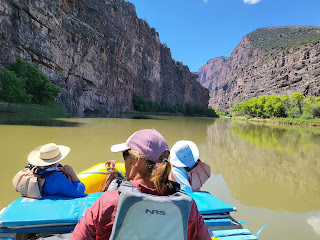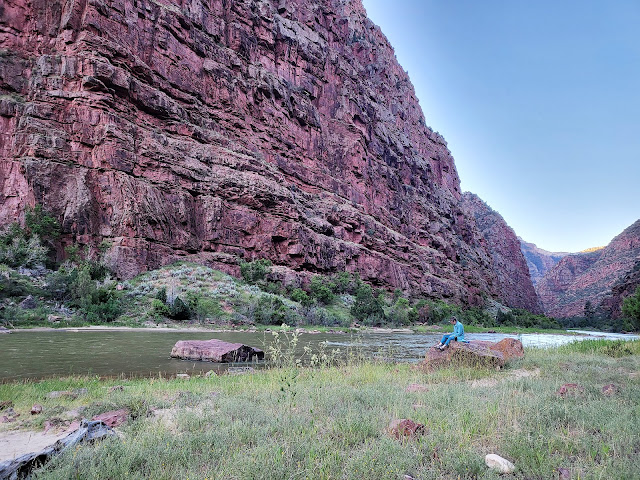Riding the Tiger with Ellen McLaughlin
"When rehearsals for King Lear started," friend, actor and playwright Ellen McLaughlin told us our first night on the river, "Just ride the tiger. That's what my director told me."
Ellen had been starring in King Lear as King Lear, a female actor portraying one of Shakespeare's most demanding and tragic male characters. The director didn't tell Ellen to hire a voice coach and learn to speak like a man, or to dress like a man (which Ellen wouldn't have done anyway). She told Ellen to ride the tiger.
The show opened and closed to packed audiences and critical acclaim. A day and a half after Ellen's final exhilarating performance, and after a brief reunion with her husband who had driven two thousand miles to celebrate their anniversary, I whisked her away for an all-women, 6-day rafting trip on Utah's Green River.
 Our trip leader Brenda had been with me for nearly all of my river writing journeys over the last twenty-six years. She approached notorious rapids like the Big Drops and Skull with intense focus. She approached the less notorious rapids the same way. The Colorado and Green have claimed lives and, like tigers, deserved our utmost respect. Our small flotilla of five oar boats and fifteen women had entered the Gates of Lodore beneath a tranquil blue sky, water bottles and river journals at the ready.
Our trip leader Brenda had been with me for nearly all of my river writing journeys over the last twenty-six years. She approached notorious rapids like the Big Drops and Skull with intense focus. She approached the less notorious rapids the same way. The Colorado and Green have claimed lives and, like tigers, deserved our utmost respect. Our small flotilla of five oar boats and fifteen women had entered the Gates of Lodore beneath a tranquil blue sky, water bottles and river journals at the ready. That first night, we gathered our camp chairs into an intimate circle beneath a galaxy of stars spun into a milky spiral more than ten billion years ago. I handed Ellen the story stick - a simple wooden stick worn satiny smooth by all the female hands that had held it. Ellen told us how she had ridden that tiger, performance after performance, all summer long.
The next morning, we greeted dawn silently, listening to the sounds of nature instead of our own chattering. We listened to canyon wrens, to water lapping at the shore, to our pens scratching thoughts onto our river journals, our spindly sentences like gangly blue herons tiptoeing across river stones.
I wrote in my journal what the director had told Ellen. Just ride the tiger.
"Stay in your body," Ellen also told us. "It's the only place you can get anything done."
Watching Ellen's friend Linn perched on a rock, I reread Linda Hogan's poem "Journey," which I had given the women before we launched. Linda wrote of rivers, reminding us that the river doesn't look back to where its been, or wonder what lies ahead, for it knows everything is before it. I felt the rough surface of the rock on which I sat and felt the compressed layers of time in the red stone, with its faceted cracks and fissures and pockets of soft sand. Solid and enduring, the rock was the embodiment of the past jutting into the present. In Linda's poem "Journey," she also writes that the animal she rides wants to drive forward, wants to overrun her banks. Are we then, I wondered, both the tiger and the actor sitting upon her back? Both rock and river?
When we ran Hell's Half Mile, no one thought of anything but the roar of the river and the vertical rush of water over stone - we were flesh and blood, bones and sinew, riding that tiger - just like we were later when we played in the canyon's rushing waterfalls to cool the heat from our bodies.
On Day Three, at Rippling Brook II, while sitting on a rock by the river, I reread Ansel Elkin's poem "Native Memory." Where the Cherokee stood on these same stones and cast their voices into the canyon below. This place, she wrote, pointing with words, you are here, a red arrow on the atlas. I thought of my Cherokee husband and his grandmother who walked the Trail of Tears, and her words brought tears. Where, I wondered, are my places? The South Platte River where cottonwoods grew, where I sat as a child on fallen trees at the edge of a pond listening to fat toads ribbeting from their perches on flat-leafed lilies?
That same river, a dear childhood friend, rose up from her banks one wet spring day and, in a wild rush of water twenty feet high, took away the pond and the lilies and the frogs and our home. Fifty years later, she's still my friend. I visit her sometimes when I'm in Denver where her flow has been tamed - for now, anyway. People picnic on her banks now. But I remember when she turned from a meandering stream winding her way to the Missouri, to a tiger clawing at everything that lay in her path.
Sitting here on the banks of the Green River, I can still smell the frog pond, the rich decay along its marshy edges. I can still feel the rapid heartbeat of a toad in the palm of my hand, can still smell the grassy scent of snakes slithering to drink at her edge, can still feel their rubbery skin against mine, still see the flick of their tongues tasting the morning air.
 Ellen McLaughlin acting the role of King Lear. Photo by Jennifer Koskiken, Colorado Shakespeare Festival. To learn more about Ellen's remarkable work, go to her website.
Ellen McLaughlin acting the role of King Lear. Photo by Jennifer Koskiken, Colorado Shakespeare Festival. To learn more about Ellen's remarkable work, go to her website. 







Comments